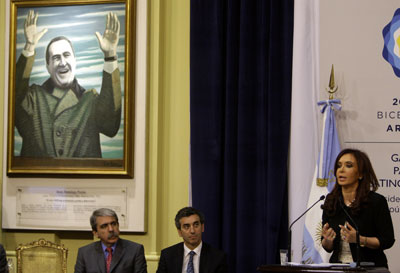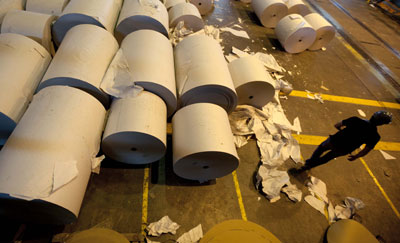Argentine Secretary of Commerce Guillermo Moreno made headlines in August 2010 when, at a meeting with the directors of newsprint manufacturer Papel Prensa, he whipped out a pair of boxing gloves, told the women present to clear out of the way, and after dimming the lights, challenged the men to a fight. Moreno’s invitation to spar, though presumably in jest, set the stage for last month’s legislative debate on Papel Prensa’s future, which though lacking for props was no less combative.
The fiercely contested piece of legislation, approved by the Senate on December 22 and quickly signed into law by President Cristina Fernández de Kirchner, establishes that newsprint is a commodity of public interest and places it under government regulation. Rather than bringing an end to debate, however, the law looks set to intensify an already long-running, bitter battle between the Kirchner administration and the country’s two leading daily newspapers, Clarín and La Nación.
Papel Prensa, Argentina’s only newsprint manufacturer, is owned by Clarín (49%), La Nación (22.5%) and the state (approximately 27.5%). The new legislation requires that the company produce at a level that fully satisfies the demand of domestic newspapers, and if it cannot, grants the state the right to increase its investment in the company to help it do so. One of the articles that has generated the most controversy, article 41, states that if the government’s investment exceeds that of the other shareholders, “…the State’s shareholding in Papel Prensa S.A. will eventually increase through this mechanism.” The law also establishes a federal advisory commission to oversee its implementation and enforcement, to be comprised of one representative of every newspaper in Argentina, except those that participate in the production of newsprint – effectively barring Clarín and La Nación — and will fall under the purview of the Ministry of Finance.
That, in a nutshell, is what the legislation says. Interpretations of what it means for the Argentine press vary widely, depending upon political affiliation. The Argentine editorial pages from both sides of the political spectrum use the vocabulary of freedom of expression, but present drastically different visions of the landscape. The divide for the most part pits Clarín and La Nación, which have obvious interests at stake, against private media groups that have aligned themselves with the left-leaning government, and often are rewarded with generous quantities of official advertisements, CPJ research shows. These clashing opinions are emblematic of the deep political polarization that has emerged in Argentina in recent years.
The government’s position centers on the perceived unfairness of Clarín and La Nación‘s control over the newsprint market for its competitors, and the legislation’s principal stated objective is to “promote measures that would widen print media’s spectrum of diversity, democratization and federalization.”
“Right now, the paper supply is being used by the private businesses that control the company,” Horacio Verbitsky, a renowned Argentine journalist, former CPJ International Press Freedom Awardee, and the director of a human rights organization, told the weekly Perfil. “They have used this monopoly to stifle the competition …driving up costs in order to drown them and remove any possibility for growth,” said Verbitsky (who has himself been criticized in some quarters for being too supportive of the Kirchner administration). A government organization under supervision of the executive branch released a report alleging that Papel Prensa takes the majority of the newsprint produced for its own use and sells the rest to other print media groups at an elevated price, according to local news reports. As supply does not fully cover the demand, other publications must import newsprint. “Clarín and La Nación‘s concentration of the paper market punishes the consumer, reduces competition, raises prices and abuses [the dailies’] dominant position,” the report says, according to daily Página 12.
La Nación, however, defended Papel Prensa by saying it satisfies 70 percent of national demand, and that any publication that does not buy from Papel Prensa is able to import tariff-free newsprint from foreign sources at often lower costs. It explained the company’s inability to keep up with demand by noting that no other company has been willing to invest in the sector and that the nation’s only other newsprint manufacturer, Papel de Tucumán, ceased manufacturing long ago because it wasn’t profitable. (Papel Prensa netted just over US$900,000 in profit for 2010, according to Bloomberg Businessweek).

Both sides have invoked grander arguments to defend their positions on Papel Prensa. The government has said the law will diversify and democratize Argentina’s media and thus guarantee freedom of expression. Clarín and La Nación, citing the article that allows the state to increase its shareholding in the manufacturer, see the law as a thinly veiled attempt to take it over. The local publishers group ADEPA wrote that “this bill constitutes a serious attack on freedom of expression. It violates constitutional provisions and international principles, such as article 13.3 of the American Convention on Human Rights,” which states that “The right of expression may not be restricted by indirect methods or means, such as the abuse of government or private controls over newsprint, radio broadcasting frequencies, or equipment used in the dissemination of information, or by any other means tending to impede the communication and circulation of ideas and opinions.” Clarín has also alleged the bill is unconstitutional, and published on the cover of its December 18 edition article 32 of the Argentine constitution, which states that Congress must not pass laws that “restrict freedom of printing presses or establish federal jurisdiction over them.” In a war of headlines, the pro-government publication Tiempo Argentino responded the next day by plastering its cover with article 42 of the Argentine constitution, which gives the state the right to guarantee fair and truthful information and to control monopolies, and the same American Convention article cited by ADEPA, but highlighting the ban on “private controls over newsprint.”
Papel Prensa is only the latest front in a protracted war between the Kirchner administration and the two dailies, particularly Clarín (owned by Grupo Clarín, one of the largest media conglomerates in Latin America). The government has long accused Grupo Clarín, which owns newspapers, radio stations, broadcast and cable television outlets, and an Internet service provider, of monopolistic activities. Critics, meanwhile, allege that Kirchner’s real objective is to attack and silence media companies that have been highly critical of her administration. The rift between the two previously cozy allies has been growing since a 2008 conflict with the farming sector over a rise in export taxes, when Clarín‘s coverage of the administration turned negative, and the government accused the group of being biased.
Clarín has been subjected in the last few years to official and other harassment, CPJ research shows, including raids by tax agents immediately following the publication of an article critical of the government, vandalizing of its offices, blockades of printing facilities, and negative posters and graffiti. Many analysts have suggested that a 2009 provision of the broadcast law that created a new regulatory agency was also aimed at weakening Grupo Clarín. While the government said the law would curb monopolies, making radio and television more democratic, media owners and opposition politicians saw it as a means for the government to exert greater control over news content and force critical media companies to divest some holdings. (Implementation of the provision has been held up in court).
The fighting has been even more bitter when the two sides have looked for historical ammunition. Clarín‘s ownership has been accused of colluding with Argentina’s military dictatorship to not only force the sale of Papel Prensa from its original proprietor (whose family was later arrested and tortured by the junta) but even of illegally adopting the children of people killed by the regime. The sale of Papel Prensa is still under investigation. The adoption charges have been disproved by DNA tests and the group Abuelas de La Plaza de Mayo, who advocated for those tests, has said the case is closed — but the implication of Clarín‘s owner in one of the country’s darkest chapters illustrates the level of animosity some Argentines feel towards the media group. Clarín and La Nación have both been criticized for being silent about the crimes of the dictatorship, and many believe that this alignment with the junta allowed them to achieve too much influence.
In the past few weeks alone, the feud has deepened with a raid on the offices of a Clarín-owned television station on charges of monopolistic activity and a freezing of La Nación‘s assets by the federal tax agency for alleged unpaid taxes. Government critics fear that these moves are just the latest in a sustained attack on one of the few institutions able to check the power of the administration.
Though it may seem quaint that battles are still being waged over something as seemingly antiquated as print media, the debate extends well beyond Argentina’s still robust market for newspapers. The feud reflects both the country’s turbulent history and its more recent political polarization, and this divide is unlikely to ease regardless of who controls Papel Prensa.
